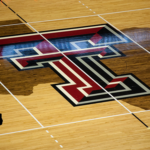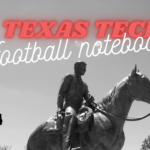This is something that I’ve been thinking about for quite some time and it was somewhat emphasized while listening to Kliff Kingsbury on with David Ubben, where Ubben asked Kingsbury if Texas Tech would be running the Power-I with the personnel returning and Kingsbury somewhat agreed:
[This is not a direct quote, but a non-transcript.] That’s the thought, let’s lean on those guys and the running backs, as we develop the quarterbacks, as we’re physical enough in the running game we can do some different stuff up front, going up against a good defense [Kingsbury is talking about his own defense] will only develop those guys.
There have been a couple of keys for me here that Texas Tech really is intent on leaning on the running game and perhaps individually, maybe they don’t add up to much, but collectively, they perhaps mean a bit more.
1. Hiring Kevin Johns. Co-offensive coordinator Kevin Johns was the offensive coordinator in name with Indiana. I’m guessing that Kevin Wilson was the guy that was probably calling plays and it was Wilson up in the booth making adjustments and providing assistance from that perspective. While at Indiana, the advanced stats are only available for 2015 and 2016. With that being said, Indiana was 19th in S&P+, 39th in Rushing S&P+, 59th in Rushing Success Rate and 66th in Rushing IsoPPP. Add in traditional stats and you had two 1,000+ yard rushers who each had 9 touchdowns that year and one running back had 4.5 yards per carry and the secon had 6.2 yards per carry. They were productive.
In 2016, the Indiana offense was 67th in S&P+ overall, 108th in Rushing S&P+, 111th in Rushing Success Rate, and 58th in Rushing IsoPPP. Obviously, the offense took a bit of a turn down.
Here’s the key, Indiana ran the ball 56% of the time in 2015 and 54% of the time in 2016, despite clearly having a worse rushing offense. They ran because that’s what they do. Compared to the Texas Tech offense last year, running the ball only 46% of the time, 37% of the time in 2016, and 43% in 2015. Granted, two fo those years were Mahomes’ years, but that’s still not many rushing plays.
In Johns one year at actually calling plays for Western Michigan, the advanced stats had WMU as the 79th best offense according to S&P+, 55th in Rushing S&P+, 25th in Rushing Success Rate and 58th in Rushing IsoPPP. In traditional stats, Western Michigan ran the ball 66% of the time.
2. Hiring Clay McGuire. IN a surprise move, Clay McGuire was hired as the co-offensive coordinator spot to share duties with Johns and is also serving as the running backs coach. McGuire spent the past 6 seasons as the offensive line coach at Washington State. By the end of McGuire’s tenure at Washington State, he had one of the better offensive lines in the nation, perennially a team that was as efficient running the ball as anyone. In 2017, the Cougars were 28th in Adjusted Line Yards, 11th in Standard Downs Line Yards and 60th in Passing Downs Line Yards. In 2016, 25th in Adjusted Line Yards, 6th in Standard Downs Line yrds and 37th in Passing Downs Line Yards. In 2016, 88th, 26th and 5th in the same categories and in 2014, 118th, 119th and 123rd.
McGuire’s lines got significantly better (as an aside, 2014 is as far back as these stats go) from 2014 to 2017. Washington State and Leach never really did run the ball, but they sure as heck were efficient as they could be in 2017 through 2015.
And when given the opportunity, the advanced stats confirm that the Cougars were efficient, but not explosive, at running the ball, 61st in Rushing S&P+, 41st in Rushing Success Rate and 108th in Rushing IsoPPP in 2017. Nearly the same thing happened in 2016 and 2015, 45th in Rushing S&P+, 16th in Rushing Success Rate and 117th in Rushing IsoPPP for 2016, and then 67th in Rushing S&P+, 6th in Rushing Success Rate, and 127th in Rushing IsoPPP.
3. Offering Tre Watson Late. Cal graduate transfer running back Tre Watson visited Texas Tech for the spring game. I’m guessing that Watson’s relationship with Brandon Jones and maybe to an extent McGuire led to Texas Tech getting a look, but it’s not so much whether Watson actually commits to Texas Tech. That matters, to an extent, but the key here is that I’m thinking that the coaches all believe that the running backs are going to really have to carry the load a lot more than what they’ve done in the past. There’s a distinct possibility that DaLeon Ward and Tre King just aren’t enough. And we didn’t see Desmond Nisby for the Frisco or the Lubbock spring games. Yes, freshmen reinforcements in Ta’Zhawn Henry and Sarodorick Thompson are on the way, but to add a veteran running back to a few guys that were maybe already established in Ward and King tells me that they plan on increasing the load.
4. Inexperienced Quarterbacks. This one doesn’t need much of an explanation and I think that Kingsbury has been clear about how he feels about his inexperienced quarterbacks. He likes them, but h’es not sure if he can depend on them. These quarterbacks just don’t have a lot of plays, but if you restrict the number of plays that they have to make mistakes then I think you’re doing them a favor. Kingsbury gets that and judging his hires, he’s moving in that direction.
5. Veteran Offensive Line. I don’t know if everyone stays healthy this year, but if the entire unit returns and if there’s some semblance of improvement for the group then I think what you’ll see is a group that is all about grinding out yards. I remember last year when Jabaar Juluke was hired, offensive line coach Brandon Jones and Juluke made it clear that they were getting on the same page and getting their fits together. The offensive line was okay, adjusted line yards were 10th overall, 77th in Standard Downs Line Yards, and 13th in Passing Downs Line Yards. But with a year of everyone returning, you can somewhat think that these guys are going to be significantly better in 2018.
6. All Part of the Plan. All five offensive line starters returning in 2018, two running backs returning and recruiting a third, hiring an offensive coordinator that has a history of running more than 50% of the time and has a history of sitting in the booth making adjustments, hiring an offensive coordinator that created an elite offensive lineman on the Palouse. Kingsbury has learned that he has to trust guys to do their jobs, he did that with the defense two years ago and maybe he’s about to do it more than you think with the offense.








